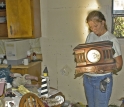|

Media Advisory 05-027
NSF Announces New Awards to Study the Impact of Katrina on People and Social Systems

Beyond buildings and levees, disasters profoundly affect humans, too
December 20, 2005
The National Science Foundation (NSF) has announced the first grants for a new wave of "rapid-response" research teams that will study the impact of Hurricane Katrina on people and social systems in the hard-hit Gulf Coast region.
Whereas the initial wave of rapid-response teams tended to focus on engineering problems--the most notable being the failure of the New Orleans' levee system--these new teams will focus on the human side of the story, including how people and organizations responded to the disaster and which factors are shaping the reconstruction. For example:
- A group led by William Wallace of the Rensselaer Polytechnic Institute and Bryan Jones of the University of Washington will study how rapid changes in budgets, procedures and missions affected the performance of the Federal Emergency Management Agency (FEMA) and the U.S. Coast Guard during the crisis;
- A group led by Nina Lam of Louisiana State University will collect time-critical data on when, where, how and why--and if--specific businesses decide to return to New Orleans;
- A group led by John Logan of Brown University will study when, where, how and why whole communities decide to return to the hurricane-ravaged area. Which were most affected by the storms? Which will be rebuilt? And how will they be different than before?
NSF expects to announce many more such awards over the next few weeks--at least two dozen of them funded under the foundation's interdisciplinary Human and Social Dynamics priority area. An up-to-date list of Katrina-related rapid response grants can be found here.
All awards on this list are being made under NSF's Small Grants for Exploratory Research (SGER) program. Although this program was created to support small-scale, exploratory, high-risk research of all kinds, it has proved to be especially well-suited for rapid-response situations because SGER requests can be processed and approved more quickly than ordinary research proposals. Indeed, NSF has previously used it to field research teams in the aftermath of both the Sept. 11 terrorist attacks and the 2004 Indian Ocean tsunami.
As comparatively quick as the SGERs are, the researchers in this program will be joining other NSF-supported investigators who have been in the field for some time.
At the University of Colorado, Boulder, for example, the National Hazards Center has funding from NSF and several other federal agencies to give grants to teams of social and behavioral science researchers, who stand ready to head into the field at a moment's notice whenever a disaster strikes. The teams deployed in response to Hurricane Katrina under that program are listed here: http://www.colorado.edu/hazards/qr/katrina.html.
-NSF-

Media Contacts
M. Mitchell Waldrop, NSF (703) 292-7752 mwaldrop@nsf.gov
Program Contacts
Keith N. Crank, NSF (703) 292-4880 kcrank@nsf.gov
Related Websites
Fact Sheet on NSF's response to Katrina: http://www.nsf.gov/news/news_summ.jsp?cntn_id=104474&org=NSF&from=news
NSF's Human and Social Dynamics priority area: http://www.nsf.gov/news/priority_areas/humansocial/index.jsp
NSF news release on New Orleans levee breaches: http://www.nsf.gov/news/news_summ.jsp?cntn_id=104555&org=NSF&from=news
NSF news release on the first SGER grants for Katrina: http://www.nsf.gov/news/news_summ.jsp?cntn_id=104482&org=NSF&from=news

The National Science Foundation (NSF) is an independent federal agency that
supports fundamental research and education across all fields of science and
engineering, with an annual budget of $6.06 billion. NSF funds reach all 50
states through grants to over 1,900 universities and institutions. Each year,
NSF receives about 45,000 competitive requests for funding, and makes over
11,500 new funding awards. NSF also awards over $400 million in
professional and service contracts yearly.
 Get News Updates by Email Get News Updates by Email
Useful NSF Web Sites:
NSF Home Page: http://www.nsf.gov
NSF News: http://www.nsf.gov/news/
For the News Media: http://www.nsf.gov/news/newsroom.jsp
Science and Engineering Statistics: http://www.nsf.gov/statistics/
Awards Searches: http://www.nsf.gov/awardsearch/
| 


